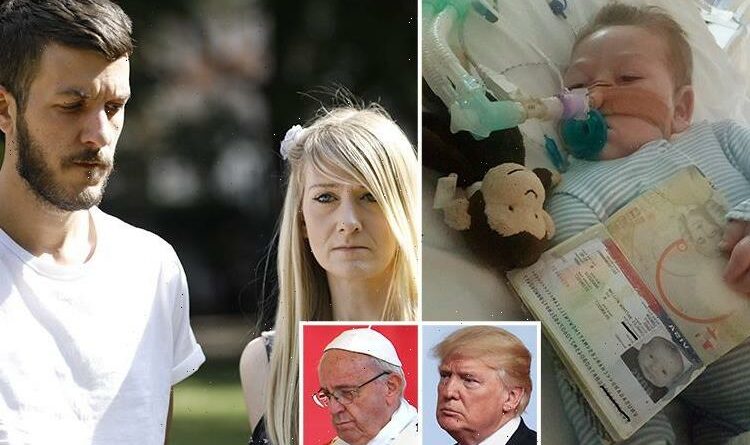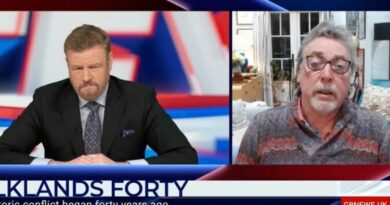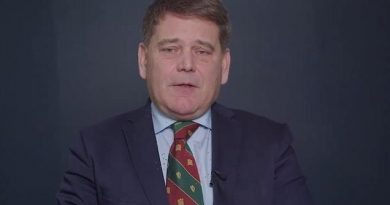Offers to help Charlie Gard from Donald Trump, the Pope and other doctors are 'unhelpful', claims Britain's top paediatrician
THE country’s top paediatrician has said interventions in the case of Charlie Gard from high-profile figures and external agencies are "unhelpful".
The stricken tot’s defiant parents yesterday delivered a a 350,000 signature petition to Great Ormond Street Hospital ahead of a High Court hearing at 2pm today into new information on the tragic case.
The Vatican and the US president tweeted their support for Connie Yates and Chris Gard and hospitals in Rome and the US have offered to take the 11-month-old in.
Pope Francis last week expressed his support for the baby's parents and said he hoped doctors would allow them to "care for their child until the end".
A Vatican-run hospital in Rome then offered to treat Gard.
Trump also waded into the debate on Monday, tweeting that the United States "would be delighted" to help.
But Professor Neena Modi, president of the Royal College of Paediatrics and Child Health, said only Charlie's family, the doctors treating him at Great Ormond Street Hospital and the legal teams know the exact details of his condition.
In an open letter from the college, Prof Modi said the UK had a "clear and compassionate framework" for making life-or-death decisions in cases such as Charlie's.
She said: "Charlie Gard's tragic case continues to attract considerable media attention with interventions from many organisations and high-profile individuals at home and abroad.
"The Royal College of Paediatrics and Child Health has been asked why we and other individual doctors have not commented on the specifics of the case.
"The reason is the duty of doctor-patient confidentiality. This means that only the family, the doctors treating Charlie, and now the legal teams involved know the details of complex issues that define his situation."
Prof Modi added: "These issues – unknown to us and all those voicing opinions – will have been considered very carefully in reaching any decision. This is why interventions by external agencies or individuals, no matter how well-intended, are unhelpful.
"Charlie's situation is heartbreaking for his parents, and difficult for everyone involved, including the doctors and nurses looking after him.
"Unfortunately situations such as this, that involve withdrawing life-sustaining treatment, are not uncommon and fall within the responsibilities of many paediatricians."
MOST READ IN NEWS
JEREMY CLARKSON Andrew, you have the PR skills of a wasp – don't make a fool of our Queen
Prince Andrew 'wants shamed actor Kevin Spacey to help him clear his name'
Jeremy Clarkson blasts 'mad' new driving rules coming into force TODAY
Devastated dad pays sweet tribute to son, 5, stabbed to death as gran held
Charlie’s parents said there was nothing to lose in giving little Charlie one last chance of life – and hailed the nucleoside bypass therapy as a potential miracle cure for the youngster's rare brain condition.
The petition called for the family to be allowed to travel to receive the experimental treatment, something currently blocked by a High Court ruling.
Connie, 31, said: "I absolutely believe this medication will work. I'm not a doctor but I feel like I am an expert in his condition now."
Dad Chris, 33, added: “We’re not strong people, but what is strong is the love for our little boy. He’s kept us going through all this.”
They said the interest of the Pope and US President Donald Trump in Charlie's case has "saved his life so far".
Ms Yates told BBC Radio 4's Today programme: "Yeah, they have saved his life so far.
"It turned it into an international issue. There are a lot of people that are outraged by what is going on. We have got new evidence now so I hope the judge changes his mind."
Prof Modi said decisions on withdrawing life support are "not made lightly" and often never reach the courts.
The circumstances when life support can be switched off include if treatment is unlikely to result in the child living much longer or where treatment may prolong life but cause suffering, she said.
Her letter ends: "When situations are hopeless or unbearable or life is limited, the focus of care rightly shifts to ensuring death is pain-free, dignified, and in the presence of loved ones.
"The case of Charlie Gard is no different.
"Amidst the sea of voices and opinions, the public deserves to know how such decisions are made."
Source: Read Full Article














